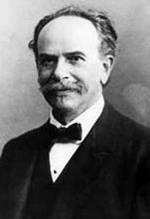Franz boas was born in Minden in 1858. After finishing school in 1877 he took up his studies of Mathematics, Physics and Geography at the University in Heidelberg. After one semester he continued his studies in Bonn. In 1879 he moved to Kiel, where he finished his PhD thesis in 1881.
Boas did further studies in Berlin, where he attended lectures by Rudolf Virchow on Physical Anthropology. Moreover, he participated in an expedition to Baffin Island in 1883/84. After spending some time in New York, he returned to Berlin in 1885 and took up a position at the newly founded Ethnological Museum Berlin (formerly: Staatliches Museum für Völkerkunde). At this time Adolf Bastian was head chairman of the museum. Moreover, Boas finished his habitation thesis in 1886.
The same year Boas also began lecturing at the Institute of Geography in Berlin. Moreover, he did his first field research to British Columbia, where he collected data among several ethnic groups (e.g., the Kwakiutl). In 1887 he migrated to the United States of America and eventually worked as assistant editor for the journal Science.
in 1888 Boas took up an assistant position at Clarke University in Worcester, where he lectured until 1892. Moreover, he became chief assistant in Anthropology at the Chicago World´s Fair in 1893. The exhibits subsequently were brought to the Field Museum, where Boas became curator.
Between 1895 and 1905 Boas worked at the American Museum of Natural History in New York. Furthermore, Boas began lecturing on Physical Anthropology at Columbia University in 1896. Three years later he took up a full professorship for Anthropology and Ethnology at Columbia University, as head of the first chair for Anthropology in the United States. He lectured at Columbia until his retirement in 1936.
Besides writing a large number of books and articles, Boas founded not only of the American Anthropological Association (AAA) but also the American Folklore Society. Furthermore, his work not only influenced other scientific subjects such as Archaeology or Linguistics but had a strong impact on american Cultural Anthropology for the first fifty years of the Twentieth Century. Boas rigorously opposed all evolutionary theories but emphasized historical particularism as well as cultural relativism. Among his students were Alfred Kroeber, Robert Lowie, Ruth Benedict and Margaret Mead.
Franz Boas died in New York in 1942.
A lifestream report on Boas' 155 anniversary is available at: http://gffstream-1.vo.llnwd.net/c1/radio/zeitzeichen/WDR5_Zeitzeichen_20130709_0920.mp3
Müller-Wille has recently published a book on Boas: The Franz Boas Enigma. Inuit, Arctic, and Sciences. 2013 Baraka Books, Montréal
(This text based on Alsayad/Seiler (eds.) 2005: Ethnologen-Lexikon. Berlin: WeißenseeVerlag, by courtesy of WeißenseeVerlag and Sibylle Alsayad; photo source: http://guides.wikinut.com/img/1akn5gn606j.whz0/Franz-Boas)



